
Frontiers of Environmental Science & Engineering
Scope & Guideline
Fostering collaboration to tackle pressing environmental challenges.
Introduction
Aims and Scopes
- Environmental Pollution and Remediation:
Research on various forms of environmental pollution, including air, water, and soil contamination, along with innovative remediation technologies and methods. - Sustainable Resource Management:
Studies focusing on the efficient management and recovery of resources, including waste treatment, recycling, and the circular economy. - Advanced Analytical Techniques:
Development and application of novel analytical methods for environmental monitoring and assessment, including the use of machine learning and advanced sensors. - Climate Change and Ecosystem Health:
Investigations into the impacts of climate change on ecosystems and human health, addressing adaptation and mitigation strategies. - Emerging Contaminants and Risks:
Research on the occurrence, fate, and health risks associated with emerging contaminants, including pharmaceuticals and microplastics. - Innovative Engineering Solutions:
Application of engineering principles to develop new technologies for environmental protection, restoration, and sustainable practices.
Trending and Emerging
- Microplastics and Nanoplastics Research:
An increasing focus on the sources, impacts, and remediation strategies for microplastics and nanoplastics, reflecting growing public concern and regulatory attention. - Machine Learning and AI in Environmental Science:
A trend towards the application of machine learning and artificial intelligence for data analysis, predictive modeling, and optimization of environmental processes. - Climate Change Mitigation Strategies:
Research on innovative strategies to mitigate the impacts of climate change, including carbon capture technologies and sustainable energy solutions, is gaining prominence. - Bioengineering and Bioremediation:
Emerging interest in bioengineering approaches, such as the use of microbial systems for pollutant degradation and resource recovery, is becoming more prevalent. - Integrated Waste Management Solutions:
A shift towards integrated approaches that combine waste management, resource recovery, and environmental protection to achieve sustainability goals.
Declining or Waning
- Traditional Wastewater Treatment Methods:
There has been a noticeable decrease in papers focusing solely on conventional wastewater treatment techniques, as researchers shift towards more innovative and integrated approaches. - Single-Contaminant Studies:
Research focusing on the effects and treatment of single contaminants is declining, with a growing preference for multi-contaminant studies that reflect real-world complexities. - Historical Pollution Assessment:
Papers centered around historical pollution assessments are less frequent, possibly due to a shift towards more immediate and actionable research addressing current environmental crises. - Basic Environmental Monitoring:
The emphasis on basic environmental monitoring techniques is waning, as studies increasingly incorporate advanced technologies and interdisciplinary methods.
Similar Journals

Environmental Sciences Europe
Exploring innovative pathways to environmental resilience.Environmental Sciences Europe is a leading peer-reviewed journal published by SPRINGER, dedicated to advancing research in the field of environmental science, with a specific focus on pollution and its mitigation. Since its transition to Open Access in 2011, the journal has been committed to disseminating high-quality research without barriers, thereby ensuring that critical knowledge is freely accessible to researchers, practitioners, and policymakers around the globe. Based in Germany and with a commendable Q1 ranking in Pollution for 2023, the journal stands out in the Scopus rankings, occupying the 23rd position out of 167 in its category, reflecting its significant impact in shaping environmental discourse. With a convergence of global research efforts projected until 2024, Environmental Sciences Europe aims to provide a vital platform for scholarly communication and collaboration, ultimately contributing to sustainable solutions for pressing environmental challenges.

Environmental Engineering Research
Bridging engineering and ecology for a sustainable world.Environmental Engineering Research, published by the Korean Society of Environmental Engineers (KSEE), stands as a pivotal journal in the field of environmental engineering. With an ISSN of 1226-1025 and an E-ISSN of 2005-968X, this esteemed journal has shown remarkable growth since its inception, converging years from 2011 to 2024. The journal is recognized in the Scopus ranking system, holding a position of #46 out of 197 in the Environmental Science category, marking it in the 76th percentile—a testament to its impact and significance in the field. Furthermore, it enjoys a commendable Q2 ranking in Environmental Engineering for 2023. While the journal operates under a traditional access model, its commitment to disseminating vital research and innovative solutions for environmental challenges enhances its appeal to researchers, professionals, and students alike. The Environmental Engineering Research journal invites contributions that advance the understanding and application of engineering principles to environmental issues, providing a forum for scholars dedicated to fostering sustainability and environmental protection.

International Journal of Environmental Science and Technology
Empowering researchers to shape environmental solutions.International Journal of Environmental Science and Technology, published by SPRINGER, stands as a premier platform for the dissemination of cutting-edge research in the fields of environmental science, technology, and engineering. With an impressive scope spanning from 2005 to 2024, this journal serves as a vital resource for academic and professional communities engaged in tackling pressing environmental challenges. It boasts a strong reputation, evidenced by its Q1 ranking in Agricultural and Biological Sciences and solid placements in Environmental Chemistry and Engineering. Researchers searching for high-impact studies will find the journal's contributions significant, as reflected in its rankings within Scopus: 34th percentile in Agricultural and Biological Sciences and notable standings in Environmental Engineering and Chemistry. Although the journal is not currently an Open Access resource, it maintains a commitment to academic rigor and innovation, making it indispensable for those devoted to advancing knowledge in environmental sustainability and technology.
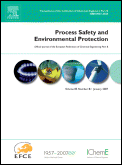
PROCESS SAFETY AND ENVIRONMENTAL PROTECTION
Unraveling the complexities of risk and reliability in engineering.PROCESS SAFETY AND ENVIRONMENTAL PROTECTION, published by Elsevier, is a premier academic journal dedicated to advancing the fields of chemical engineering, environmental science, and safety management. With an impressive impact factor, this esteemed journal undergoes a meticulous peer-review process and serves as a vital platform for researchers, professionals, and students seeking to disseminate cutting-edge research and innovative practices. Submissions are welcome in a wide scope of topics related to safety, risk, reliability, and environmental engineering, demonstrating its influence as a Q1 journal across multiple categories, including Environmental Chemistry and Safety, Risk, Reliability and Quality. By providing a rigorous analysis of current challenges and solutions in the domain since its inception in 1990, it continues to foster interdisciplinary collaboration and practical applications in the United Kingdom and beyond. With the journal not currently offering Open Access options, subscribers gain exclusive access to pivotal insights that shape industry standards and drive advancements in sustainable practices.

ENVIRONMENTAL ENGINEERING SCIENCE
Catalyzing change through cutting-edge environmental research.ENVIRONMENTAL ENGINEERING SCIENCE is a leading journal published by MARY ANN LIEBERT, INC that provides a platform for pioneering research in the fields of environmental chemistry, pollution control, and waste management. With an ISSN of 1092-8758 and an E-ISSN of 1557-9018, this peer-reviewed journal aims to disseminate high-quality scientific studies that address critical environmental challenges. As evidenced by its 2023 category quartile rankings, it holds a notable position at Q3 in Environmental Chemistry and Pollution and Q2 in Waste Management and Disposal, highlighting its relevance and impact in these domains. Spanning over two decades from 1997 to 2024, the journal is dedicated to fostering innovations and promoting rigorous scholarship that can contribute significantly to sustainable environmental practices globally. Authors and researchers are encouraged to engage with this essential resource, which offers Open Access options to enhance the visibility and reach of their work. For those interested in advancing their understanding and practice within the environmental sciences, ENVIRONMENTAL ENGINEERING SCIENCE is an indispensable journal to consider.
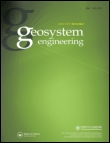
Geosystem Engineering
Driving interdisciplinary dialogue for environmental progress.Geosystem Engineering, published by Taylor & Francis Ltd, is a prominent academic journal focusing on the interdisciplinary fields of Environmental Engineering, Pollution, and Waste Management and Disposal. With an ISSN of 1226-9328 and an E-ISSN of 2166-3394, this journal has been a significant contributor to the scholarly discussions since its inception in 1998 and continues to publish impactful research up to 2024. As a recognized journal within the Q3 category for its respective fields as of 2023, it serves as a vital platform for researchers, professionals, and students aiming to disseminate findings, share innovations, and address pressing environmental challenges. Although it does not currently offer Open Access options, Geosystem Engineering remains essential for those invested in advancing sustainable practices and technologies in geosystems. The journal delivers critical insights that contribute to the development of policies and practices aimed at improving environmental quality and waste management strategies globally.

Euro-Mediterranean Journal for Environmental Integration
Cultivating Insights for the Ecological Future of the MediterraneanThe Euro-Mediterranean Journal for Environmental Integration, published by SPRINGER HEIDELBERG, serves as a pivotal platform for interdisciplinary research in the realm of environmental science, particularly focused on the unique ecological and socio-economic context of the Euro-Mediterranean region. With its ISSN 2365-6433 and E-ISSN 2365-7448, this journal aims to foster a collaborative approach to environmental challenges, integrating insights from various fields such as ecology, geography, and sustainable development. Since its inception in 2016, it has made significant strides, achieving a Q3 ranking in Environmental Science and maintaining a notable position within the Scopus rankings, sitting at #102 out of 233 in the general environmental science category, which reflects its growing influence in academic discourse. The journal is committed to open dialogue among researchers, professionals, and students aimed at advancing knowledge and promoting innovative solutions to pressing environmental issues. Access to its comprehensive articles and findings will be key to contributing to a more sustainable future.
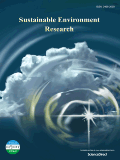
Sustainable Environment Research
Exploring transformative ideas in environmental engineering.Sustainable Environment Research, an esteemed journal published by BMC, serves as a pivotal platform for disseminating innovative research in the fields of Environmental Engineering, Pollution, and Renewable Energy. Established in 2016 as an Open Access journal, it facilitates the widespread sharing of knowledge and advancements across the globe, reflecting its commitment to enhancing environmental sustainability. With an impressive Q1 ranking in multiple categories, including Water Science and Technology and Pollution, the journal is recognized for its significant impact, currently holding a rank of 31st in Environmental Science - Water Science and Technology. The journal actively invites researchers, professionals, and students to contribute to crucial discussions around sustainable practices and technologies, thus addressing worldwide environmental challenges. Based in Taiwan but accessible internationally, Sustainable Environment Research provides a valuable resource for those dedicated to advancing the science of sustainability.
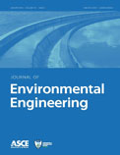
JOURNAL OF ENVIRONMENTAL ENGINEERING
Exploring innovative pathways to environmental sustainability.JOURNAL OF ENVIRONMENTAL ENGINEERING, published by the American Society of Civil Engineers (ASCE), stands as a pivotal platform within the realm of environmental engineering and civil infrastructure. With an ISSN of 0733-9372 and an E-ISSN of 1943-7870, this esteemed journal has been delivering high-quality research since its inception in 1973 and continues to play a crucial role in advancing knowledge through to 2024. The journal boasts respectable impact factors, achieving Q2 rankings in Civil and Structural Engineering, Environmental Engineering, and Environmental Science, while also maintaining a solid presence in Environmental Chemistry. With Scopus rankings reflecting a strong competitive advantage across various specializations, it serves as a vital resource for researchers, professionals, and students focused on solving complex environmental challenges. Though not an open-access publication, its rigorous selection process ensures that only high-caliber studies are disseminated, making it an indispensable read for anyone involved in the interdisciplinary fields linking engineering and environmental sustainability. Addressing contemporary issues and shaping future innovations, the JOURNAL OF ENVIRONMENTAL ENGINEERING remains committed to fostering dialogue and disseminating impactful research.
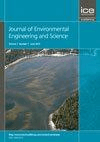
Journal of Environmental Engineering and Science
Unveiling Cutting-Edge Methodologies in Environmental StudiesJournal of Environmental Engineering and Science, published by Emerald Group Publishing Ltd, is a prominent academic platform dedicated to the dissemination of cutting-edge research in the fields of environmental engineering, chemistry, and science. This journal, with ISSN 1496-2551 and E-ISSN 1496-256X, features a comprehensive collection of studies that delve into innovative methodologies and practical applications aimed at solving pressing environmental issues. Having been published since 2002, it spans critical research years from 2015 to 2024, offering insights that are invaluable to both academics and practitioners alike. With its current rankings placing it in the fourth quartile for Environmental Chemistry and Engineering, and the third quartile in miscellaneous Environmental Science, the journal serves as a significant yet under-utilized resource for emerging scholars seeking to contribute to the ecological discourse. Though it does not offer Open Access, the content is meticulously curated to uphold academic rigor, catering especially to researchers, professionals, and students keen on advancing their understanding of environmental challenges and engineering solutions.